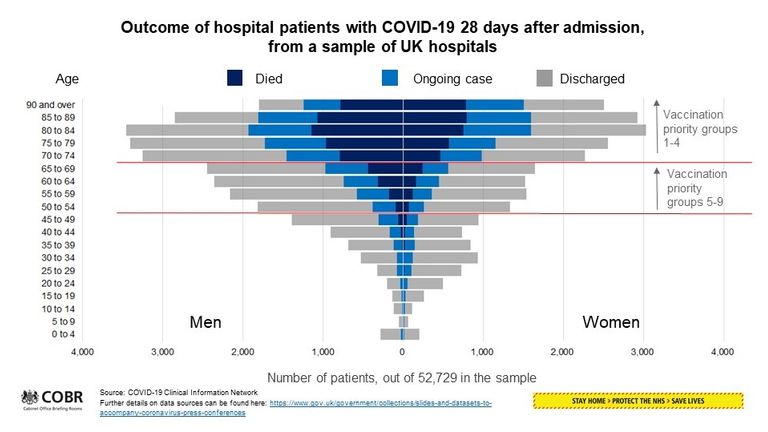The coronavirus infection rate in the UK is “still alarmingly high”, the prime minister has said, but England’s chief medical officer has suggested we are past the current peak.
Boris Johnson told a Downing Street news briefing that while there were “signs of hope”, as he hailed the UK passing the milestone of having administered 10 million first doses of a COVID-19 vaccine.
Live COVID updates from the UK and around the world
Latest official figures show the UK has recorded another 1,322 deaths within 28 days of a positive coronavirus test, as well as a further 19,202 new cases of the virus.
Appearing alongside the prime minister, England’s chief medical officer Professor Chris Whitty said it looked as if the UK was past the peak of the current wave.
But he echoed the PM, saying that although rates are coming down they are still “incredibly high” and could go up again quickly, putting the NHS “back into trouble extraordinarily fast”.
“I think that most of my colleagues think we are past the peak,” Professor Whitty said.
“That doesn’t mean you can never have another peak, but at this point in time – provided people continue to follow the guidelines – we are on the downward slope of cases, hospitalisation and of deaths in all four nations of the United Kingdom, so I think we do think, at this point, this peak at least, we are past.”
Professor Whitty said that while the number of people in hospital with coronavirus has “quite noticeably” reduced, it is still above that of the first peak in April last year.
“So this is still a very major problem, but it is one that is heading the right way,” he said.
On the number of deaths, Professor Whitty added that the numbers will “stay high for quite some time” but should reduce.
“The first effects we will see on vaccination are likely to be on these death numbers,” he explained.
Ministers have set a target of offering a first jab to 15 million of the most vulnerable people by the middle of this month, a target they appear on course to meet.
The PM said the focus of the government was on vaccinating everybody as quickly as possible and then “taking a view on the interaction between that and the prevalence of the disease”.
“At the moment the level of infection is still forbiddingly high for us to imagine the relaxation of the current guidelines,” he added.
Mr Johnson said ministers were “worried about vaccine hesitancy in some parts of the country in some communities” and that it was “unquestionably an issue”.
“We are doing everything we can to encourage people to come forward, to give them all the confidence they need. They should have confidence – it’s a great thing to get a vaccine,” he said.
Data from Oxford University released on Monday shows that its vaccine may have a “substantial effect” on transmission of the virus, reducing it by two thirds.
According to its latest research, the first dose of the Oxford/AstraZeneca jab offers protection of 76% up to three months, with the efficacy increasing to 82.4% if a second dose is administered 12 weeks later.
The PM hailed this news, saying: “The evidence increasingly shows that our vaccines achieve this crucial objective:
to reduce death and serious illness from those major strains of COVID that have been subject to research.”
Mr Johnson told the news conference that he believe 8 March was a “prudent” date to begin the phased reopening of schools in England.
Subscribe to the Daily podcast on Apple Podcasts, Google Podcasts, Spotify, Spreaker
The PM said he would lay out a “route map” for the easing of lockdown restrictions on 22 February – and stressed the UK would be in a “very different situation” to last summer where the prevalence of the virus had been reduced but there was no vaccine.
He dropped another hint that the country may not return to regional restrictions as lockdown is eased, saying: “It feels to us, at the moment, as though we’ll be going down in tiers nationally but obviously that could change.”
Looking to the longer term, Professor Whitty said that the prospect of every adult being offered a first dose of a vaccine by May and a second by August is “at the very optimistic end” because of supply constraints.
Asked about the possibility of this timescale by Sky’s deputy political editor Sam Coates, he said: “I think that May and August strike me as at the very optimistic end.
“I think if you talk to people who are doing this extraordinarily fast rollout, and if you look at this globally, this is an extraordinarily fast rollout.
“They would say, they will go absolutely hell for leather, as people are doing an incredible job, but trying to hit those dates, that is probably beyond what is possible given the constraints of supply and all the other things that we have to deal with.”



